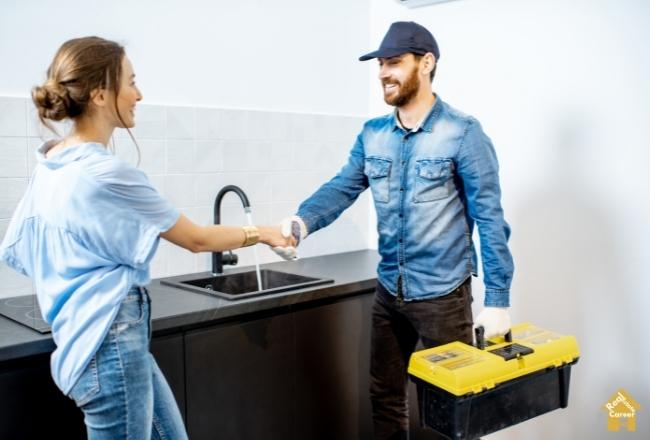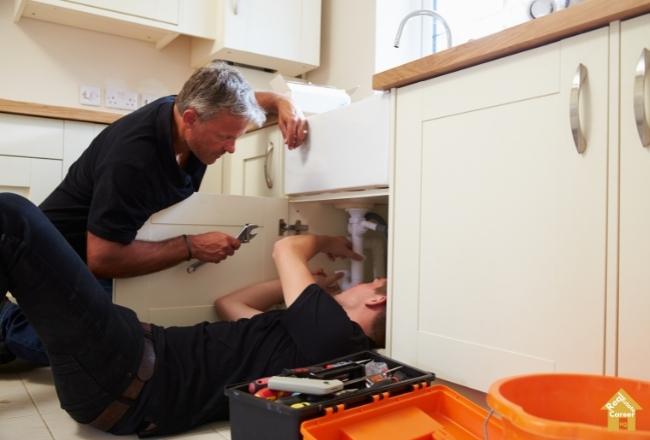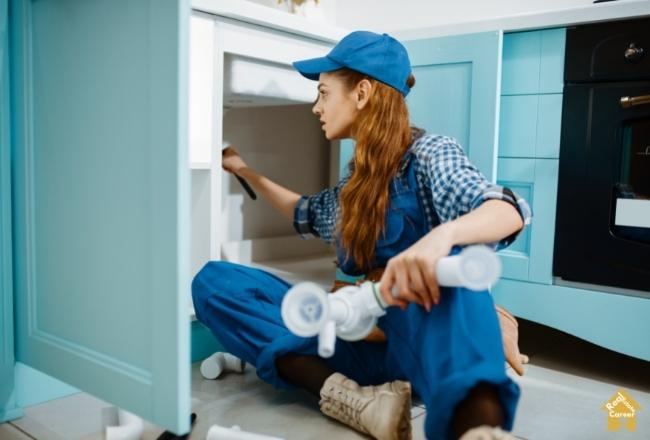(**) Disclosure: This post may contain affiliate links, meaning RealEstateCareerHQ.com will get a commission if you decide to make a purchase through the links, but at no additional cost to you.
So you’re interested in a plumbing career in Colorado? That’s great, this is the perfect guide for you!
A plumber is a tradesperson who specializes in installing and maintaining systems used for water, sewage, and drainage. Plumbers are responsible for ensuring that these systems are installed correctly and function properly. The work involved could be complicated and may impact the health and safety of the community,
In Colorado, all plumbers are required to obtain a license from Colorado Department of Regulatory Agencies (DORA) Division of Professions and Occupations through the Colorado State Plumbing Board
There are three types of plumbing licenses in Colorado:
- Residential License
- Journeyman License
- Master License
To become a licensed plumber in Colorado, an applicant must be at least 18 years old, hold a high school diploma, register as an apprentice, obtain two years (3,400 hours) of plumbing work experience and pass the Residential Plumber Exam. The prospective licensee must submit an application and fees to the Colorado State Plumbing Board.
If you wish to upgrade the plumber license, you need to obtain four years (6,800 hours) to become a journeyman plumber and five years (8,500 hours) to become a master plumber. Both licenses also have their own exam requirement.
In this guide, you will learn about the steps to obtaining the different plumber licenses in Colorado. You will also find income updates, education programs, and FAQs on this profession.
So read on to learn more about what it takes to launch your plumbing career!
6 Steps to Become a Licensed Plumber in Colorado

Step 1: Meet the eligibility requirement
You must be at least 18 years old and have a high school diploma or its equivalent GED.
As you can imagine, there will be lots of measuring and gauging while working in the field. Therefore, having good math skills such as geometry, algebra, and metric measurements is certainly an asset.
Also, a strong understanding of science is necessary to understand how plumbing systems work. Physics, chemistry, and thermodynamics are particularly important for those who want to enter this field.
Step 2: Enroll in an apprenticeship program

Now, it’s time to equip yourself with the technical skills and knowledge required for the job. You need to register as an apprentice.
This is where you work under the supervision of a mentor, where you will receive on-the-job training. Through this day-to-day work experience, you should develop essential skills such as draining, venting, pipe cutting & soldering, water heating systems, and the local plumbing codes.
Here’s the Colorado Registered Apprenticeship Programs Directory. In there, you may find the list of apprenticeship program sponsors available in Colorado. If you have any questions on the apprenticeship program, you may also contact apprenticeship@state.co.us.
To make sure that your work hours can be counted toward the licensing requirement, keep in mind that you must be registered as apprentice plumber within 30 days of beginning work.
Step 3: Register as a Residential Plumber
After you work as a registered apprentice for two years (3,400 hours), you may apply for a Residential Plumber license.
A Residential Plumber allows you to install plumbing and equipment in one-, two-, three-, and four-family dwellings, but cannot be more than two stories above ground.
To obtain this license, you’ll need to pass the Residential Plumbers exam. The Colorado Residential Plumber Exam consists of 100 questions, and with 240 minutes of writing time. The required passing score is at least 70%. There is an exam fee of $78.
After you pass the Residential Plumber Exam, you can submit an application and $100 fee to the Colorado State Plumbing Board.
Since the Plumbing Board has the responsibility to protect the public interest, they will also require you to disclose if there have been any disciplinary actions against your professional or trades license. You are also required to go through a background check.
If you have any questions, you may contact the Division of Professions and Occupations
- 1560 Broadway, Suite 1350, Denver, CO 80202
- Phone: 303-894-7800 | Fax: 303-894-7693 | Email: dora_dpo_licensing@state.co.us
Step 4: Apply for the Colorado Journeyman Plumber License
If you want the flexibility to work on projects other than strictly residential units, you’ll need to continue to accrue more documented work experience and upgrade the plumbing license.
To obtain the Colorado Journeyman Plumber license, the applicant must:
- Obtain 4 years (6,800 hours) of plumbing-related work experience.
- Pass the Journeyman Plumber exam
- Submit a license application and a fee of $120 to the Colorado State Plumbing Board.
The Colorado Journeyman Plumber Exam consists of 100 questions, and writing time limit of 240 minutes. The required passing score is at least 70%. There is an exam fee of $78.
Step 5: Upgrade to a Master Plumber license
If you want to upgrade your career to the next level, you should consider upgrading to a “Master Plumber” license. With a Master Plumber license, you can work on larger projects and demand a higher salary.
To become a master plumber in Colorado, an applicant:
- Have at least five years of plumbing-related work experience (8,500 hours)
- Pass the Master Plumber exam
- Submit a license application and pay the $140 license fee.
The Colorado Master Plumber Exam consists of 120 questions, and writing time limit of 300 minutes. The required passing score is at least 70%. There is an exam fee of $78.
Step 6: Renew the plumbing license
All Colorado Journey Plumber licensees must to renew their license on February 28 of odd-numbered years. The renewal fee
- Apprentice $30
- Residential $100
- Journeyman $120
- Master $140
On the other hand, all Master Plumbers must renew their license every three years and there is a renewal fee of $300.
To ensure that you’re keeping up with the Colorado Plumbing Code, all licensed plumbers are required to take an approved 8-hours of continuing education. (So a total of 16 CE credits for each 2-year renewal term.)
More info on the Colorado Plumber Exams

The Colorado Plumber Exams are administered by the PSI testing services. Its purpose is to ensure all plumbing licensees are equipped with the necessary skills and knowledge to perform plumbing-related work competently.
There is a exam fee of $75. You will immediately receive a notification of the result after writing it. You should retain this notification as this is needed when submitting the license application. If you do need to retake the exam, there is a fee of $73.
Summary of the Colorado Plumber Exams
| Exam | # of Questions | Minimum passing score | Time |
|---|---|---|---|
| Residential Plumber | 100 | 70% | 270 minutes |
| Journeyman Plumber | 100 | 70% | 270 minutes |
| Master Plumber | 120 | 70% | 300 minutes |
Colorado Plumber Exams Content Outline
| Exam Content Area | Residential Plumber | Journeyman Plumber | Master Plumber |
|---|---|---|---|
| Water Supply | 15 | 12 | 14 |
| Vents | 21 | 20 | 22 |
| Fixtures and Equipment | 12 | 8 | 10 |
| Piping Support and System Protection | 11 | 5 | 6 |
| Traps, Interceptors, and Separators | 5 | 5 | 6 |
| Storm Drainage Systems | N/A | 10 | 12 |
| Sanitary Drainage Systems | 21 | 20 | 22 |
| Indirect and Special Waste Piping | N/A | 5 | 6 |
| Isometric Analysis | N/A | 5 | 10 |
| Residential Fire Sprinklers | 7 | 5 | 6 |
| Water Heaters | 8 | 5 | 6 |
FAQ on being a plumber in Colorado

How much do plumbers make in Colorado?
According to the Bureau of Labor Statistics (May 2021), plumbers, pipefitters and steamfitters in Colorado make an average yearly income of $59,090. The income range typically ranges between $47,230 and $62,500. Top earning Colorado plumbers make over $78,210.
Your earning ability as a plumber is subjected to many variables such as your experience, licensing level, the type of properties you specialize, the company size, its location, and most importantly, the amount of effort you are willing to put into this career.
What is the outlook of being a plumber in Colorado?
According to the U.S. Bureau of Labor and Statistics (May 2021), nationally speaking, the job outlook of plumbers is projected to grow at 5% from 2020 to 2030 and Colorado has 8,670 plumbers. However, as I’m reviewing the data on CareerOneStop, (this is a site sponsored by US. Department of Labor), the employment growth for plumbers between 2018 to 2028 was projected to be 33%!
“Contractors are hiring. In the 2020 AGC-Autodesk Workforce Survey, 60% of firms in the U.S. and 62% of firms in Colorado had unfilled hourly craft positions on June 30, 2020”
Quote from Associated General Contractors of America (AGC) – The Economic Impact of Construction in the United States and Colorado
Unfilled hourly craft positions may include plumbers, electricians, and HVAC technicians.
How long does it take to become a plumber in Colorado?
It takes at least two years (3,400 hours) to become a residential plumber in Colorado, four years (6,800 hours) to become a journeyman plumber and five years (8,500 hours) to become a master plumber. That is the minimum period to fulfill the work experience requirement. The duration would also depend on how long you complete the apprenticeship program, and pass the state-required exam.
How much does it cost to become a plumber in Colorado?
It costs $178 to $218 to obtain a plumbing license in Colorado, which includes the exam fee and application fee. The fees would depend on the plumbing license you’re pursuing. Here’s the breakdown
- Apprentice Registration: $30
- Residential Plumber: (Application fee: $100, Exam fee: $78)
- Journeyman Plumber: (Application fee: $120, Exam fee: $78)
- Master Plumber: (Application fee: $140, Exam fee: $78)
In addition to the above, there will be other expenses such as tuition, E&O insurance, and plumbing equipment. Some companies may pay or reimburse you if you work as their employee. But if you are running your own practice, these are the cost you need to account for yourself.
Which states have plumbing license reciprocity with Colorado?
Colorado has no reciprocity agreement with any other states at this time. However, the CO State Plumbing Board may consider licensed plumbers from other states to apply through endorsement from another licensing agency.
To do so, you need to provide documents
- showing that you’ve met the minimum work experience requirements
- a copy of your qualifying, equivalent license from another state.
Note that the license needs to be active and in good standing. It should be issued at the state level, where you passed a state-administered exam covering topics on the International Plumbing Code (IPC).
(**) Affiliate Disclosure: Please note that some of the links above are affiliate links, and at no additional cost to you. Our company, JCHQ Publishing will earn a commission if you decide to make a purchase after clicking on the link. Please understand that we include them based on our experience or the research on these companies or products, and we recommend them because they are helpful and useful, not because of the small commissions we make if you decide to buy something through the links. Please do not spend any money on these products unless you feel you need them or that they will help you achieve your goals.
Disclaimer: The information in this post is for general information only, and not intend to provide any advice. They are subjected to change without any notice, and not guaranteed to be error-free. Some of the posts on this site may contain views and opinions from individual not related to JCHQ Publishing. They do not necessarily reflect our view or position.
Reference:
- Colorado Department of Regulatory Agencies (DORA) (source)
- Colorado State Plumbing Board (source)
- Candidate Information Bulletin (source)
- PSI Exam
- Bureau of Labor Statistics – Plumbers, Pipefitters, and Steamfitters (source)
- CareerOneStop (source)
- AGC- The Economic Impact of Construction in the United States and Colorado (source)

